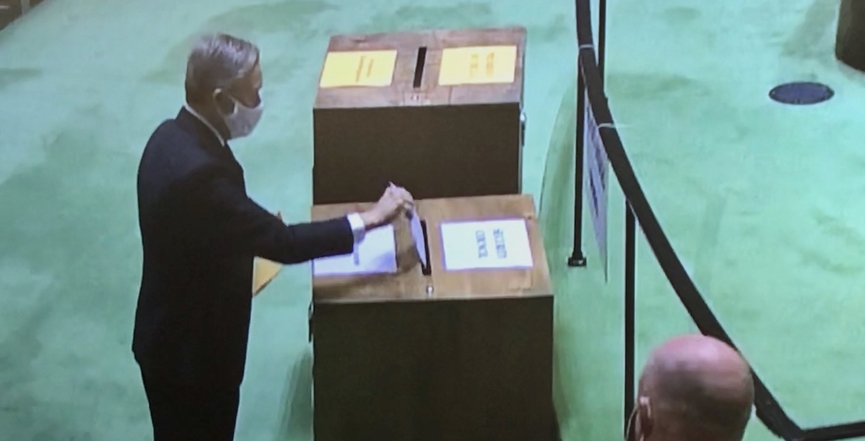In 2016, U.S. president Barack Obama famously said, “The world needs more Canada.” Earlier this week, however, the world spoke for itself when it rejected Canada’s candidacy for one of two open spots for a two-year non-permanent seat at the UN Security Council (UNSC).
The vote was a resounding rebuke to the Trudeau government’s public relations campaign for one of the coveted seats. Despite its membership in the G7 and G20, and its many alliances in the Americas, Europe and the Asia-Pacific region, Canada (population 37 million) was beaten out by Norway (population 5.3 million) and Ireland (population 4.9 million).
It was yet another sign that despite the mythologies that Canada’s political elite may spin, Canada has declined on the world stage. Canadians like to think of themselves as a benevolent, peace-loving presence in the world, but the reality is that for many countries, Canada’s agenda of recent years seems little different from that of the U.S.
No doubt there are many reasons that Canada’s campaign for a UNSC seat failed. Most analyses pointed out that Norway spends fully one per cent of its gross national income on international development assistance, as compared to Canada’s 0.27 per cent. And for its part, Ireland has contributed far more to UN peacekeeping missions than Canada has in recent years.
But there’s also the sense that the Trudeau government lacks sincerity as it makes promises to invest in a better world. It talks about addressing climate change, but invests in oil pipelines and fails to meet its international climate targets. It signs on to the international Arms Trade Treaty, and provides humanitarian aid to Yemen, but fails to curb arms sales to Saudi Arabia, one of the worst human rights violators in the world.
Results from an EKOS survey released this week demonstrate that Canadians expect substantive engagement from Canada on international files. A strong majority of Canadians feel the government should increase its commitment to combatting climate change, and a majority of Canadians feel the government should increase its contribution to international peacekeeping.
The instances of insincerity go on: the Trudeau government’s failure to address centuries of disrespect of Indigenous rights; its failure to rein in rogue Canadian mining companies; its failure to counter U.S. militarism.
The elephant in the room, however, is Canada’s embarrassing record of diplomatic cover for Israel’s human rights violations.
In 2018, when speaking in Israel, Canada’s then-foreign affairs minister Chrystia Freeland claimed that, were it successful in its bid for a UNSC seat, Canada would try to be an “asset for Israel.” This assertion builds on years of one-sided voting at the UN — under both Harper and Trudeau — where Canada repeatedly joins Israel and the U.S. in a small minority to vote against resolutions seeking to hold Israel accountable for its human rights violations.
More than any other act, Canada’s attempt to protect Israel from international condemnation was embodied in its threat to cut funding to the International Criminal Court (ICC) if the court proceeded with a war crimes investigation against Israeli officials.
To be fair, the Trudeau government gives lip service to a negotiated solution to the conflict in Israel-Palestine. But since there have not been negotiations between Israel and the Palestinians since 2014, this is literally meaningless, especially to Palestinians living under a brutal Israeli military occupation.
Indeed, frustration over the Trudeau government’s absurd policy on Israel-Palestine grew so intense it resulted in a grassroots Canadian movement against Canada’s UNSC bid!
In the campaign directed toward the 193 UN delegations, over 100 Canadian organizations and dozens of prominent individuals urged countries to vote against Canada’s candidacy at the UNSC. And while the Canadian government did not want to concede that this grassroots campaign got much traction, a defensive letter in response last week from Canada’s permanent representative to the UN belies any such claim.
The EKOS poll last week demonstrated that, on the question of Israel-Palestine, not only is the Trudeau government out of step with the international community, it is also out of step with a majority of the members of the Liberal party, who want Canada to increase its support for Palestinian human rights.
The perplexing thing about Canada’s support for powerful and militaristic interests is that it really works against Canada’s long-term interests. As a middle power with a relatively small population, Canada depends on a multi-lateral, rules-based world system in order to thrive.
As the arctic melts, for example, Canada’s claim to its arctic territories is more solidly rooted in the protections of international law than in the protection provided through the Canadian Forces. As such, if Canada fails to stand up for the legitimate rights of average Palestinians, Saudis, Yemenis and others, it also whittles away at its own protections.
In his concession speech after the UN vote, Foreign Affairs Minister François-Philippe Champagne claimed to have learned important lessons from the bid for the UNSC seat: “We convened, we listened and we learned from other countries around the world.”
Let’s hope he has. Otherwise, Canada seems destined to continue to undermine the very institutions that protect it, and may face yet another humiliating defeat the next time it vies for another UNSC seat.
Thomas Woodley is president of Canadians for Justice and Peace in the Middle East (CJPME), a Canadian non-profit whose mission is to empower Canadians of all backgrounds to promote justice, development and peace in the Middle East.



